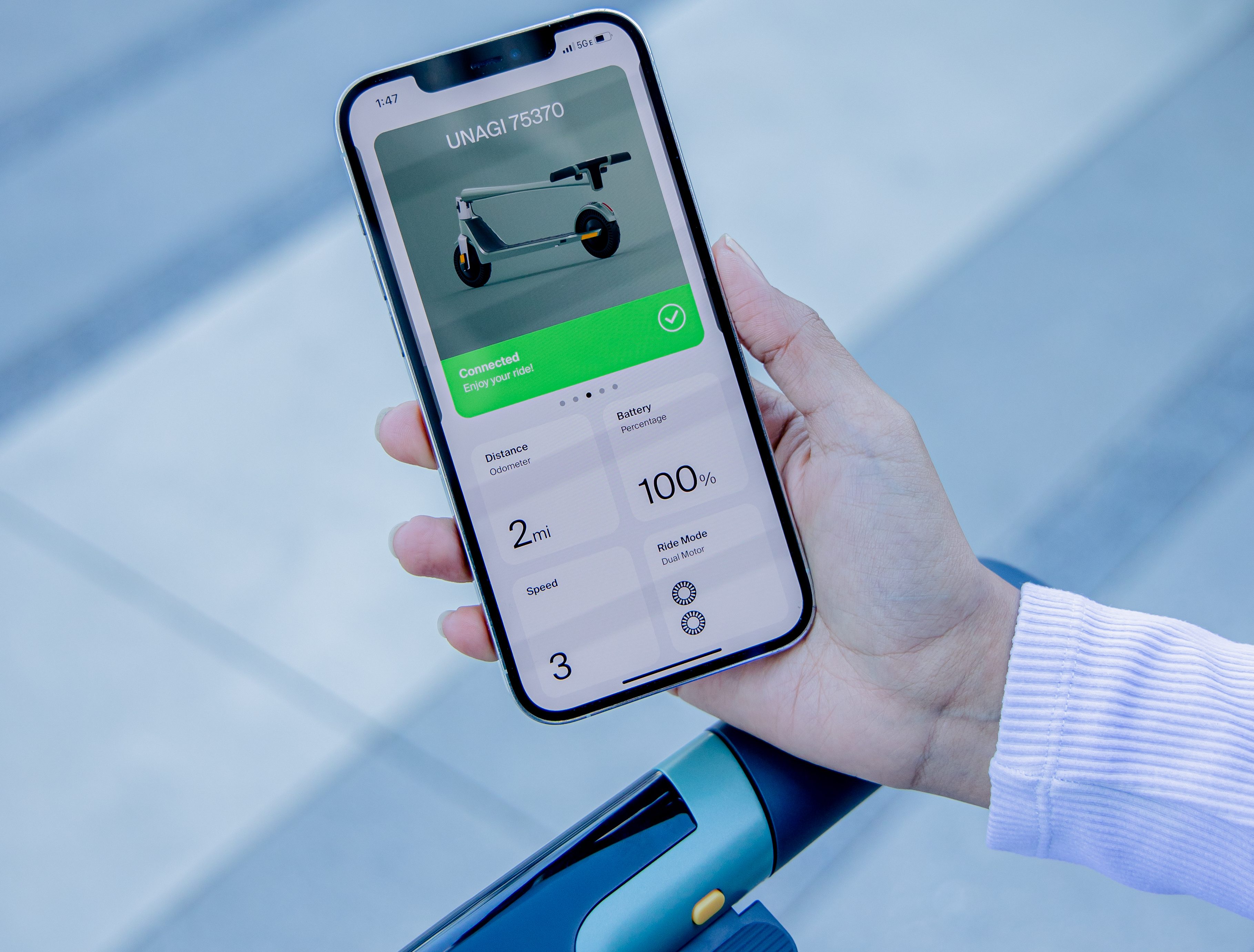E-scooter manufacturer Unagi has had a busy month. Just a couple weeks after bringing its Model One Voyager scooter to market, the company says it closed a large funding round and secured Best Buy as a scooter subscription partner.
The $29.3 million round is a combination of equity and debt. The $17.3 million in equity is led by Ecosystem Integrity Fund with Menlo Ventures and Pure Capital participating. The remaining $10 million in debt is led by Aegon Asset Management, which joins Unagi’s existing credit provider Horizon Technology Finance.
Unagi has become well known not only for its lightweight e-scooters that are perfect for city-based customers, but also for its subscription business that offers a commitment- and maintenance-free experience at a reasonable price. While the company does sell its scooters direct-to-consumer and through retail partners, almost 90% of the business is now subscription-based. It’s almost to the point that Unagi might consider halting sales altogether, T.J. Compagnone, Unagi’s chief product officer, told TechCrunch.
The funds will be used to grow that subscription business, and the partnership with Best Buy is one piece of Unagi’s strategy. Unagi has partnered with Best Buy, as well as other retailers, to sell its scooters for a couple of years. But David Hyman, CEO and founder, told TechCrunch selling scooters through a retail partner can be challenging.
“Cashflow timing, tight margins, processing returns, customer service, etc. So we’ve entirely pivoted to focusing on subscriptions via retail partners,” said Hyman.
Now customers can go to BestBuy.com to register for an Unagi subscription, which costs the same there as it would on Unagi’s website — $59 per month for the Model One Classic and $69 per month for the newly released Model One Voyager.
Customers who register through Best Buy will have the $50 registration fee waived, something Unagi is willing to sacrifice for the visibility of being on a leading U.S. retailer’s site.
“From Best Buy (or any retail partner) perspective, this is an incredibly compelling proposition. Like shared partnerships, Unagi handles all fulfillment, service and operations,” said Hyman. “So for Best Buy, there is no inventory to hold. No cash to lay out. No customer service or returns. It’s a very simple way to receive a pure-profit bounty without any costs. We think this is a business model that will soon become commonplace in all Big Box retailers and Unagi wants to be on the leading edge of establishing these new business models.”
Best Buy offers a range of electric micromobility vehicles for sale, but this might be the first time the company is doing an e-scooter subscription service. However, it’s not Best Buy’s first rodeo with hardware-as-a-service. Last October, Best Buy launched Upgrade+ to help customers finance the purchase of new devices like Mac laptops and other Apple products.
Scooters-as-a-Service

Development for Unagi’s new mobile app began with the Model Eleven, a project that ended up being too expensive to take to production. Image Credits: Unagi
Hyman said it is actually surprising to see how much more popular the subscription business is than the retail side of things. The unit economics have gotten to a good place, too, with gross margins of 50%, according to the founder.
Unagi expects to be profitable by this year — and the company means net profitable, not adjusted.
“From a strategy point of view, with a SaaS style company, their valuation multiplier on $1 of revenue is, in good times, up to 30x and in bad times 10x,” said Compagnone. “As a sales company, your multiplier as a function of revenue is like 1 to 1.5x. Hardware-as-a-service is a new space where there aren’t a lot of proxies, but we’re finding that in good times, we’re doing 12x to 15x, and in bad times 8x to 10x. So this is the place we want to be instead of sales, for sure.”
Aside from the Best Buy partnership, Unagi hopes to boost its subscription offering by partnering with enterprises. The company already works with Google to give employees access to subscription costs, which are 100% reimbursable to them.
“We are going to imminently launch a program where employees that work at companies who have known transportation reimbursements will receive exclusive benefits on Unagi’s website (i.e. waiving $50 signup fee and/or monthly discounts) simply by registering with their work email address,” said Hyman. “We will auto-detect their domain and apply the appropriate benefit to their transaction. They can then easily access their subscription account for receipts to easily receive employer reimbursement.”
Hyman said he expects the enterprise program to be one of the biggest growth drivers in the coming year, with about 25% of all subscriptions coming from that vertical.
The focus on subscriptions is also part of the reason why Unagi had to throw in the towel on its much-hyped Model Eleven scooter last year. The $2,440 scooter, Hyman’s passion project, was expected to be extremely smart, with features like Bluetooth speakers so you can blast music or turn-by-turn directions, remote kill and even advanced rider assistance sensors.
Unfortunately, as the subscription business became more dominant, the likelihood of being able to offer the Eleven for monthly rental at less than $100 per month dwindled.
“And that was the real death knell,” said Hyman, noting that Unagi had begun that project before even beginning to offer subscriptions.
Unagi repurposed the smart mobile app for its new Voyager, and Hyman said many of the Eleven’s elements will come into new future products.
“We’ve got a scooter scheduled for hopefully by the end of this year that will incorporate more of the Eleven’s elements,” he said.
Unagi secures Best Buy as e-scooter subscription partner by Rebecca Bellan originally published on TechCrunch
